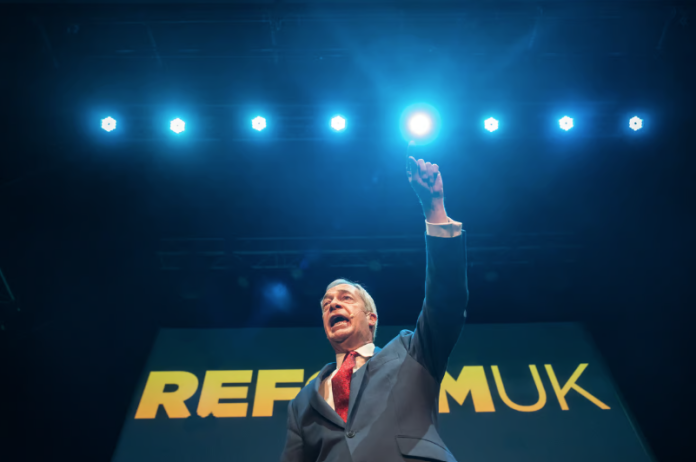
The Reform UK leader has broken with Musk over a far-right activist. But it’s his plan to win big that’ll keep Keir Starmer up at night.
LEICESTER, England — Nigel Farage and Elon Musk are having a lovers’ tiff. But don’t expect it to derail the Brexiteer’s meticulous plan to take over the United Kingdom.
The Reform UK leader this weekend strongly distanced himself from jailed far-right agitator Tommy Robinson, despite Musk — whose cash and backing he’s been openly courting — loudly demanding Robinson’s release from prison.
It’s caused the first major rift between the two close allies of Donald Trump, and comes just after Farage made a big play for Musk’s help with a smile-for-the-cameras trip to Trump’s Mar-a-Lago resort.
Benjamin Harnwell, a critic of Musk who has been overseeing Trump ally Steve Bannon’s proposed right-wing academy to train Europe’s populists. “Elon has been part of this movement for five minutes.”
Reform’s increasing swagger was on show in the English city of Leicester this weekend, as a regional conference showed it continuing to bag defectors from Britain’s main opposition Conservative Party and sounding bullish about hurting Britain’s struggling Labour government.
At the gathering Friday, the mood was largely celebratory as over a thousand members saluted the party’s progress in last year’s general election. But the Robinson row wasn’t far from members’ minds.
“Listen to Tommy Robinson,” came a heckle from one member of the crowd during MP Lee Anderson’s speech. After a second pro-Robinson heckle, a visibly angry Anderson told the man to “shut up or get out.”
“I like Tommy and think he’s been treated awfully,” a long-time Reform UK activist and organizer said in Leicester. “But he and Reform are separate and it should stay that way.”
The same person argued that any allying with Robinson — who co-founded the race-baiting English Defense League and was jailed for breaching a court order put in place because of his repeated libeling of a Syrian schoolboy — would serve only as a distraction from Farage’s wider goal of upending British politics.
“Personally, I very strongly think Tommy Robinson is part of the solution rather than the problem,” said Harnwell. “But the fact is, the U.K. isn’t there yet, and is a very long way from being so.”

As for Farage himself, his allies argue that despite Musk’s proximity to Trump, the Reform leader’s longstanding relationship with the incoming president is strong enough to survive any spat.
In his speech to the faithful in Leicester on Friday, Farage aped Trump by saying he plans to “make Britain great again.”
And it’s that plan — a step-by-step capturing of key parts of the U.K. — and not the noise from Musk that’s likely to keep incumbent Prime Minister Keir Starmer up at night.
Sharpening up
The Brexiteer-in-chief, who stunned Westminster in last year’s election by returning to the helm of Reform and winning a long-coveted seat in Parliament — has spent much of this year trying to professionalize his Reform UK party, shaking up its comms operation, bagging Tory defectors, and getting serious about taking the fight to Labour.
Farage and four other candidates made it into the House of Commons in July’s election — winning more than four million votes for his anti-immigration, populist outfit and putting the Conservatives on the backfoot. They came second in 98 seats, 89 of which were behind Labour.
Now, he wants to use a series of local and regional elections to show Reform can replace the Conservatives, booted out of office in July, as the natural party of the right.
“What we need to do as a party is demonstrate that we can win at the ballot box, that we can be a formidable electoral force,” Reform UK Chair Zia Yusuf said in an interview with POLITICO.
The aim is to bring it more into line with other successful national outfits — and avoid the kind of controversies over openly racist candidates that flared up during the summer campaign. That may in part explain Farage’s desire to swiftly distance himself from Robinson, despite Musk’s vociferous backing for the jailed activist.
Reform is already eyeing elections next May as a milestone on its path to power. Seats on 21 county councils and 10 unitary authorities in England are up for grabs, and, with Labour facing a bumpy first five months in office, Farage fancies his chances.
POLITICO’s poll of polls shows Labour — who won a thumping House of Commons majority last summer — just five points clear of Reform.
Ahead of May’s votes, Reform has set up hundreds of branches across the country, with the aim of allowing local members to target areas they know best. Reform claimed 100,000 members in November, and has been busy urging Tory councillors to defect.
The local build-up has already allowed Reform to stand in numerous council by-elections, where it has won seats from Labour and the Tories. “We’re very excited by the progress, but we’re not complacent by any means,” Yusuf said.

Still, it’s an uphill climb for a party that is building its infrastructure as it goes. Even with burgeoning branches and a growing membership Farage likes to crow about, Reform cannot count on the kind of deep institutional experience Labour and the Tories possess when it comes to local fights — not to mention the kind of data on household voting which allows for precise targeting in a tight race.
“We are working very much from a start-up perspective … and it’s going to be damn hard,” acknowledged Reform’s former Director of Communications Gawain Towler. “It’s like you’ve got a great mass of organic material and we are having to push through it and put the nerve system into that organic material piecemeal.”
First, we take Scotland
If he does deal Labour and the Tories a bloody nose in May, expect Farage’s attention to then turn swiftly to the next big test — elections for the Scottish Parliament and Welsh Senedd in 2026.
Political scientist John Curtice wrote late last year that, were elections to the Scottish Parliament held now, Farage “could win as many as a dozen seats” — a big leap for a party that currently has no representation there.
Scotland’s semi-proportional voting system offers a way in for Reform, even if it continues to poll at just over 10 percent in the country. Farage has a checkered history in Scotland — and was famously being greeted by angry Scots on one visit in 2013, where he was locked in a pub for his own protection. He didn’t visit Scotland at all in the lead up to this year’s general election — with his party describing it as too “dangerous.”
The ruling Scottish National Party has long pointed to the non-breakthrough of parties led by Farage — and the relative unpopularity of Brexit in Scotland — as examples of how Scotland’s values and politics differ from England.
Yet others doubt Scotland is quite so immune to the Farage charm.
“The SNP are desperate to say Scotland is different and there’s no market for this politics here,” a senior elected Scottish Labour figure, granted anonymity to speak frankly, like others in this story, said. “It’s dangerously complacent and doesn’t square with the evidence.”
Farage’s deputy, Richard Tice, has even argued his party could be the “kingmakers” in Scotland after the election, which is set to be tightly fought between the long-reigning SNP and a Scottish Labour Party which has been bruised by Starmer’s tricky start to life in Downing Street.
Reform’s catch-all populist approach poses a challenge to both parties — as well as to the center-right Scottish Conservatives — and those who met Reform voters on the doorsteps in last year’s general election campaign say Farage peeled votes from all corners.
“[Reform voters] came from everywhere, there were SNP voters, and former Tories and Labour, who said they were considering Reform,” a former SNP MP who lost their seat in July said.
“What they had in common was they felt scunnered with everyone,” they added, using a Scottish slang term for deep annoyance.
Welsh woes
An even more winnable prize in 2026 looks like Wales, where Reform is looking to leap over the Conservatives and become the official opposition to Labour.
In a statement of intent, Reform launched its general election manifesto in Merthyr Tydfil, a former Welsh mining town struggling with deindustrialization. It came second at July’s general election in 13 Welsh constituencies. And the party held a conference in Newport — once a steel powerhouse — just last month.

“They’re areas which have perfectly legitimate reasons to not be happy with the status quo in Wales at the moment,” noted Will Hayward, a freelance investigative journalist who specializes in Welsh politics.
Indeed, the state of its main opponents means the ground looks fertile for a Reform revolt in Wales. “To a certain extent, you make your own luck, but you ride other people’s misfortune,” said Towler.
Welsh Labour has led its devolved government for 25 years. It’s faced internal turmoil recently, cycling through two first ministers in quick succession.
Meanwhile the Conservatives, Labour’s main challengers in Wales, are facing their own deep disarray. The Welsh Tories are, said Hayward, a “bit of a busted flush” — and they’ve so far struggled to see off the Reform threat, despite doing their best to ape Farage.
“They’re essentially a Reform light,” said Hayward. But he added: “I just don’t think you can run an anti-establishment style party when you’re the Conservative Party.”
“Reform’s best prospects will come if they’re seen as an acceptable alternative to Tories in places where Tories can’t win,” said Robert Ford, a University of Manchester academic who co-wrote “Revolt on the Right” about the rise of Farage’s former outfit, UKIP.
Power to the people
Farage, meanwhile, has been quietly trying to reshape Reform behind the scenes.
While the party was originally set up as Farage’s personal vehicle, he last year handed more control of the outfit to its members. They can now adapt the party structure, and are able to remove the leader if at least 50 percent of the membership write to the chair requesting a vote of no confidence.
It’s not a selfless move: The hope is that expanded powers will make members more willing to get out in the rain and campaign. But it’s not without risk for Farage.
“Farage’s perennial complaint about UKIP was its membership was a mess and its internal democratic structures were a source of no end of trouble and frustration,” said Ford.
Reform is optimistic that an in-house vetting team sifting through prospective candidates will clean up its act. Towler said internal vetters were the first people employed after the election, with scrutiny of prospective candidates going down to a parish council level.
“We are learning to walk before we try and run,” said Towler. The party, he said, rejects a third of prospective candidates hoping to run for local government. He conceded, however: “Some bad apples will slip through. That’s the nature of the world. But nothing is perfect in this naughty world.”
While a chunk of cash from the billionaire Musk would boost Reform significantly — worried Conservatives feared up to $100 million from the X owner — Farage hardly seems to be hard-up without him.
Billionaire property developer Nick Candy’s defection from the Tories to Reform this month and promise of a seven-figure donation as the incoming party treasurer will go down a treat. The party only has 16 full time members of staff, so there’s plenty of room to grow.
And despite Musk’s headline-grabbing call for a major shake-up at the top of Reform, the party remains very much the Farage show.
“It is a party with one giant and a bunch of invisible dwarves,” argued Ford. The leader remains “head and shoulders and belt and braces and knees above everyone else,” he said.
So long as he keeps winning, that seems to suit his key lieutenants just fine. “Nigel has universal support amongst our members,” said Yusuf. “He’s going to be the next prime minister of this country and hopefully serve multiple terms.”





















